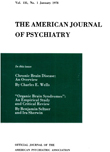EFFECTS OF METHIONINE AND HYDROXYCHLOROQUINE IN SCHIZOPHRENIA
Abstract
Two matching groups of schizophrenic patients refractory to conventional therapies were given methionine and hydroxychloroquine, respectively, following two base periods. Significant differences were observed in improvements and release rates and in the Standardized Affect Conveying Test. The methionine group showed exacerbation of symptomatology, while the hydroxychloroquine group showed amelioration of symptoms. The eosinophils and lymphocytes showed downward trend in the methionine group and so did the skin reactivity to intradermal injections. These results support the hypothesis that the schizophrenic process is exacerbated by increased effort readiness without discharge, as enhanced by methionine administration. The significant ameliorating effect of hydroxychloroquine is offered as a tool for therapeutic studies.
Access content
To read the fulltext, please use one of the options below to sign in or purchase access.- Personal login
- Institutional Login
- Sign in via OpenAthens
- Register for access
-
Please login/register if you wish to pair your device and check access availability.
Not a subscriber?
PsychiatryOnline subscription options offer access to the DSM-5 library, books, journals, CME, and patient resources. This all-in-one virtual library provides psychiatrists and mental health professionals with key resources for diagnosis, treatment, research, and professional development.
Need more help? PsychiatryOnline Customer Service may be reached by emailing [email protected] or by calling 800-368-5777 (in the U.S.) or 703-907-7322 (outside the U.S.).



